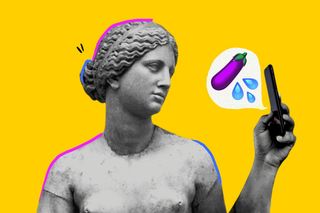
Why Sexual Openers Are a Major Turn‑Off for Women on Dating Apps, According to Science
“I never want to ‘yuck’ anyone’s ‘yum’ as long as it is between two consenting adults, but consent can be a problem with initiation messages.”

The virtual universe of dating apps is structured around a simple premise: swipe left, swipe right, and voilà, the labyrinth of love awaits. Much like in the real world, what follows is rarely predictable — a right swipe might lead one directly into the arms of the love of their life, but it could also end in a glorious one-night stand, the matches might develop a friendship for the ages, and if nothing else, one might learn a practical lesson in boundaries, or their lack thereof. A common experience that falls under the last category is encountering a breed of individuals who swear by unsolicited sauciness on dating apps.
Amid the vast ocean of potential suitors, lurk individuals who seem convinced that etiquette demands they send sexually charged opening texts to their matches — often, women. The truth, however, couldn’t be further from it. Published in Personal Relationships, a recent study concluded that people seeking long-term relationships on dating apps, irrespective of their gender, reacted negatively to sexually explicit openers; those keen on casual encounters weren’t nearly as put off. Overwhelmingly, though, women involved the study were more strongly opposed to racy openers, compared to men.
“I’m a woman who is there for hookups, but I’ll still ignore a sexual opening message. Makes me cringe,” a Reddit user noted in 2021. Yet, the experience is so prevalent that in 2017, a dating app incorporated a pledge to ensure its uses didn’t behave inappropriately. “[B]efore our members can interact with the [online dating] community… they must first agree not to send any harassing or unwanted, sexually explicit messages,” the company announced, adding that the app’s users will also be reminded that not adhering to the pledge will get them banned.
Related on The Swaddle:
Tindstagramming Is A Creepy Online Dating Trend That Needs To Stop
Patriarchy perpetuates the notion that women’s sexuality is available for public consumption — undermining the importance of consent and boundaries. Conditioned thus, men often feel entitled to sending sexually charged openers to women, disregarding the discomfort that follows.
Besides being a blatant display of male entitlement, the sexual openers forced upon women also serve to reinforce skewed power dynamics — with men attempting to assert control over women they barely even know, through sexual advances like, “Do you want to play with my anaconda?” This is a mild one, though, especially when compared to: “Are your legs like an Oreo? Cu[z’] I wanna split them apart and eat the good stuff in the middle,” “I’ll hold your hand in public and y[our] throat in private,” and “…I absolutely wouldn’t mind burying my face between those two.” Unfortunately, texts like these are alarmingly common for women on dating apps.
A past survey of almost 5,000 adults suggested that 57% of women between the ages of 18 and 34, who were active on dating apps, received sexually explicit texts — and sometimes, even pictures — that were absolutely unsolicited. Only 28% of male users, on the other hand, had faced this. Not only that, but compared to just 23% of male responders who were called offensive names on dating apps, for 44% of women, it was a common experience.
Related on The Swaddle:
In the Digital Era, Dating to Increase Your Social Capital Has a Name: ‘Throning’
Feeling devalued and disrespected, thus, women often end up being reluctant to engage with the person who triggered these feelings. “I never want to ‘yuck’ anyone’s ‘yum’ as long as it is between two consenting adults, but consent can be a problem with initiation messages because there is no previous communication to establish consent,” says Amanda Lilly from the Department of Communication Studies and Philosophy at Utah State University in the U.S. Lilly, who co-authored the recent study, further adds, “Even people who are more tolerant of sexualized initiation messages don’t view them positively, kind of neutral at best… I would caution people from using these types of messages because if they want to start a relationship, they don’t want to sexually harass their potential partner.”
In a world where women are frequently objectified without their consent — both online and offline — for many, dating apps can feel safer than going out and meeting people. A creep at a bar, who has physical access to them, can be a lot more dangerous than an online match who opens with a sleazy one-liner. That doesn’t, however, mean that the latter isn’t dehumanizing. But if one were to force a silver lining onto women, repeatedly, being subject to sexually-charged openers, perhaps, it’s this: a crude opening pitch can enable one to filter out the kind of matches they’d rather not expose themselves to in person.
Lilly also has a message for the ones sending the explicit texts: “[E]xtensive online dating use without success is damaging people’s mental health, so it kind of seems like a majority of the time [sensing sexual openers] would result in negative consequences for the sender.” In other words, it helps no one.
Devrupa Rakshit is an Associate Editor at The Swaddle. She is a lawyer by education, a poet by accident, a painter by shaukh, and autistic by birth. You can find her on Instagram @devruparakshit.
Related


Woe Is Me! “My Best Friend Cut Me Off When I Couldn’t Fix Her Mental Health. Should I Reconnect?”
